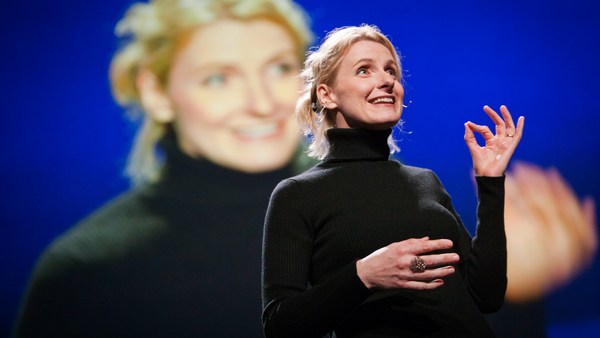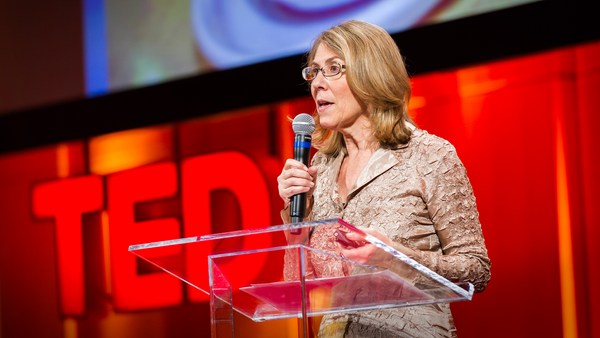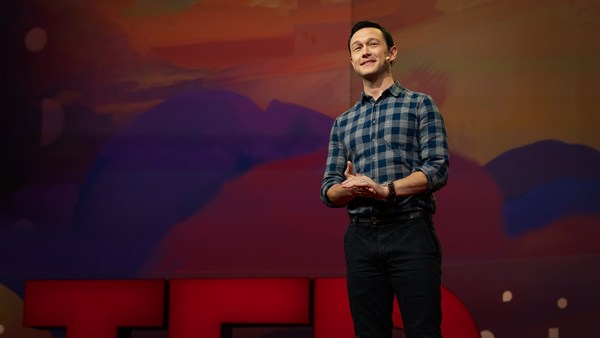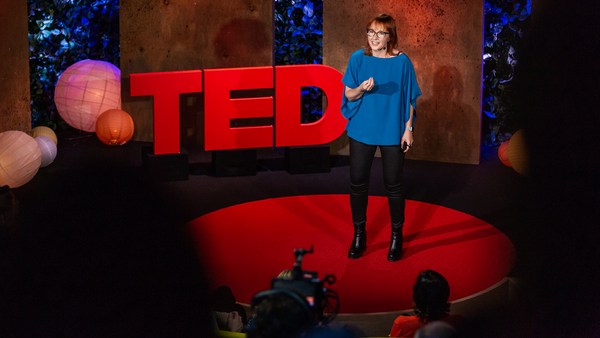I grew up diagnosed as phobically shy, and, like at least 20 other people in a room of this size, I was a stutterer. Do you dare raise your hand?
And it sticks with us. It really does stick with us, because when we are treated that way, we feel invisible sometimes, or talked around and at. And as I started to look at people, which is mostly all I did, I noticed that some people really wanted attention and recognition. Remember, I was young then. So what did they do? What we still do perhaps too often. We talk about ourselves. And yet there are other people I observed who had what I called a mutuality mindset. In each situation, they found a way to talk about us and create that "us" idea.
So my idea to reimagine the world is to see it one where we all become greater opportunity-makers with and for others. There's no greater opportunity or call for action for us now than to become opportunity-makers who use best talents together more often for the greater good and accomplish things we couldn't have done on our own. And I want to talk to you about that, because even more than giving, even more than giving, is the capacity for us to do something smarter together for the greater good that lifts us both up and that can scale. That's why I'm sitting here. But I also want to point something else out: Each one of you is better than anybody else at something. That disproves that popular notion that if you're the smartest person in the room, you're in the wrong room. (Laughter)
So let me tell you about a Hollywood party I went to a couple years back, and I met this up-and-coming actress, and we were soon talking about something that we both felt passionately about: public art. And she had the fervent belief that every new building in Los Angeles should have public art in it. She wanted a regulation for it, and she fervently started — who is here from Chicago? — she fervently started talking about these bean-shaped reflective sculptures in Millennium Park, and people would walk up to it and they'd smile in the reflection of it, and they'd pose and they'd vamp and they'd take selfies together, and they'd laugh. And as she was talking, a thought came to my mind. I said, "I know someone you ought to meet. He's getting out of San Quentin in a couple of weeks" — (Laughter) — "and he shares your fervent desire that art should engage and enable people to connect." He spent five years in solitary, and I met him because I gave a speech at San Quentin, and he's articulate and he's rather easy on the eyes because he's buff. He had workout regime he did every day. (Laughter) I think she was following me at that point. I said, "He'd be an unexpected ally." And not just that. There's James. He's an architect and he's a professor, and he loves place-making, and place-making is when you have those mini-plazas and those urban walkways and where they're dotted with art, where people draw and come up and talk sometimes. I think they'd make good allies. And indeed they were. They met together. They prepared. They spoke in front of the Los Angeles City Council. And the council members not only passed the regulation, half of them came down and asked to pose with them afterwards. They were startling, compelling and credible. You can't buy that.
What I'm asking you to consider is what kind of opportunity- makers we might become, because more than wealth or fancy titles or a lot of contacts, it's our capacity to connect around each other's better side and bring it out. And I'm not saying this is easy, and I'm sure many of you have made the wrong moves too about who you wanted to connect with, but what I want to suggest is, this is an opportunity. I started thinking about it way back when I was a Wall Street Journal reporter and I was in Europe and I was supposed to cover trends and trends that transcended business or politics or lifestyle. So I had to have contacts in different worlds very different than mine, because otherwise you couldn't spot the trends. And third, I had to write the story in a way stepping into the reader's shoes, so they could see how these trends could affect their lives. That's what opportunity-makers do.
And here's a strange thing: Unlike an increasing number of Americans who are working and living and playing with people who think exactly like them because we then become more rigid and extreme, opportunity-makers are actively seeking situations with people unlike them, and they're building relationships, and because they do that, they have trusted relationships where they can bring the right team in and recruit them to solve a problem better and faster and seize more opportunities. They're not affronted by differences, they're fascinated by them, and that is a huge shift in mindset, and once you feel it, you want it to happen a lot more. This world is calling out for us to have a collective mindset, and I believe in doing that. It's especially important now. Why is it important now? Because things can be devised like drones and drugs and data collection, and they can be devised by more people and cheaper ways for beneficial purposes and then, as we know from the news every day, they can be used for dangerous ones. It calls on us, each of us, to a higher calling.
But here's the icing on the cake: It's not just the first opportunity that you do with somebody else that's probably your greatest, as an institution or an individual. It's after you've had that experience and you trust each other. It's the unexpected things that you devise later on you never could have predicted. For example, Marty is the husband of that actress I mentioned, and he watched them when they were practicing, and he was soon talking to Wally, my friend the ex-con, about that exercise regime. And he thought, I have a set of racquetball courts. That guy could teach it. A lot of people who work there are members at my courts. They're frequent travelers. They could practice in their hotel room, no equipment provided. That's how Wally got hired. Not only that, years later he was also teaching racquetball. Years after that, he was teaching the racquetball teachers. What I'm suggesting is, when you connect with people around a shared interest and action, you're accustomed to serendipitous things happening into the future, and I think that's what we're looking at. We open ourselves up to those opportunities, and in this room are key players in technology, key players who are uniquely positioned to do this, to scale systems and projects together.
So here's what I'm calling for you to do. Remember the three traits of opportunity-makers. Opportunity-makers keep honing their top strength and they become pattern seekers. They get involved in different worlds than their worlds so they're trusted and they can see those patterns, and they communicate to connect around sweet spots of shared interest.
So what I'm asking you is, the world is hungry. I truly believe, in my firsthand experience, the world is hungry for us to unite together as opportunity-makers and to emulate those behaviors as so many of you already do — I know that firsthand — and to reimagine a world where we use our best talents together more often to accomplish greater things together than we could on our own. Just remember, as Dave Liniger once said, "You can't succeed coming to the potluck with only a fork." (Laughter)
Thank you very much. Thank you. (Applause)




